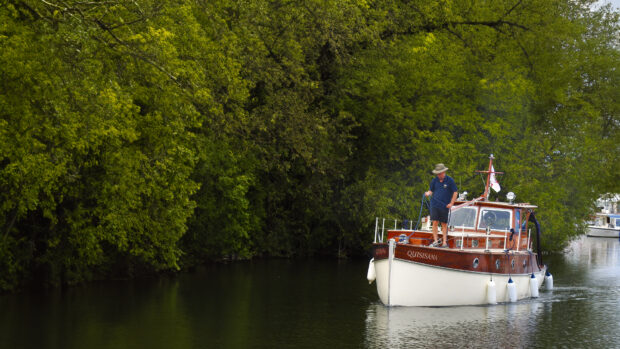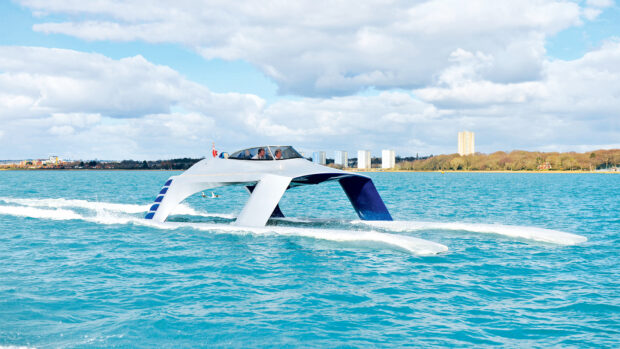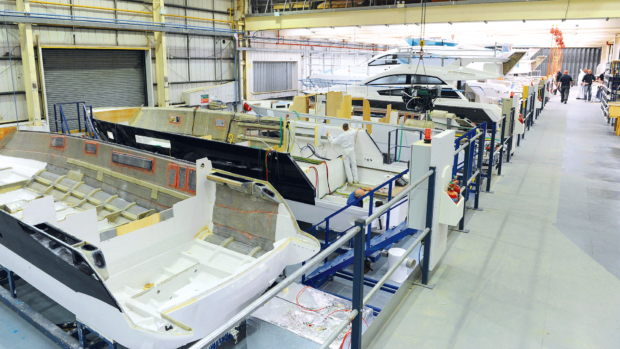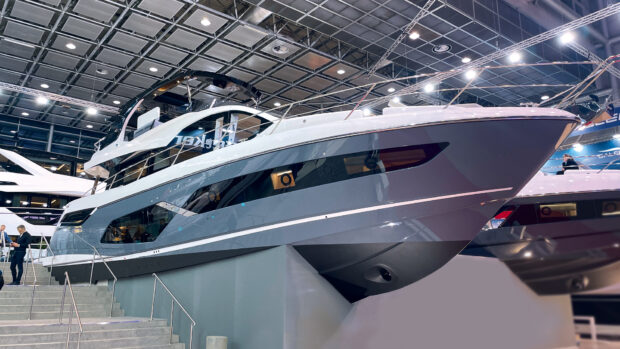Norwegian start-up Evoy has launched the world’s most powerful electric outboard. Hugo Andreae, editor of MBY, gauges its might with a test run…
Until recently, if you wanted to buy an electric sportsboat your only option was to knock on the door of a handful of specialist electric boat manufacturers such as Candela, X-Shore, Rand or Vita.
For the price of a small apartment, they would sell you a purpose-built electric sportsboat. But what if you didn’t like the styling or the layout of the boat itself? What if you already knew the make and model you wanted and just wanted to swap the petrol engine for an electric outboard?
That’s where Evoy comes in. This Norwegian based start-up has been designing and building powerful electric motors for boats since 2019, initially for inboard craft but more recently for outboard powered ones too.
It launched its first off-the-shelf electric outboard, the 120hp Breeze, earlier this year, but at the 2022 Cannes Yachting Festival it unveiled something altogether more exciting – the prototype of an all-new 300hp electric outboard called the Evoy Storm.
Using many of the same components as its own proven 400hp inboard electric motor but detuned to fit inside the casing of a Mercury Verado L6 outboard, it is the closest thing yet to a bolt-on electric solution.
Article continues below…

E-Motion 180: World’s most powerful electric outboard takes aim at petrol rivals

Mercury Marine to launch Avator electric outboard in 2023
Although currently still in development, the Evoy Storm is very much a working prototype that has already been fitted to a number of partner brands’ boats, including an Iguana amphibious craft.
But by far the most significant partnership is with Axopar. As one of the most popular and successful sportsboat manufacturers in the world, this prolific Finnish/Polish boat builder plans to make the Evoy a factory-fit option on its 25ft model.
In fact, so confident are both companies in the performance and reliability of their new offering that they even let us take it out for a short sea trial.

Thanks to the 300hp Evoy Storm electric outboard, this Axopar 25 delivers an astonishing 50 knots as well as a very refined and comfortable ride
Driving impressions
Having tested a number of other electric boats, including the foiling Candela C-8, X-Shore Eelex 8000 and Vita Lion, we were intrigued to see how well a production-built boat like the Axopar 25 adapted to battery power. The short answer is astonishingly well.
Despite a 450kg weight penalty over a fully fuelled petrol boat, and five passengers, we still recorded a top speed of over 50 knots – vastly quicker than any other electric boat we’ve tested and not far off the world speed record for a production electric boat of 57.7 knots (held by a Goldfish X9 powered by a 400hp Evoy inboard).
Of course at this speed, it will chomp through the two 63kWh Kreisel batteries at a rather alarming rate, but at a more modest (but still rapid) 26 knots it’s claimed to give a range of 25nm – much the same as most bespoke electric boats.

For context, we took it out for about 40 minutes of pretty hard use, including a number of flat-out acceleration and max speed runs and returned to harbour with 63% battery charge remaining.
In normal use, when much of the time you’ll be pottering in and out of harbour interspersed with a couple of faster hops along the coast to a favourite beach or anchorage, that should be enough for a typical day’s outing.
The boat comes fitted with a 22kW charger for overnight recharging from a standard marina shorepower cable. It can also be hooked up to a DC supercharger for a 0-80% boost in just 45 minutes.

The two main batteries sit low down in the hull, under all the control and charging systems seen here
But perhaps the most surprising thing about this electric Axopar is just how normal it feels. The absence of noise and vibration when you first cast off is a bit disconcerting, but once you apply some throttle, the gentle burble of water being churned up by the propeller proves strangely reassuring.
The throttle itself is made by Dometic while Evoy provides the integrated 10in or 16in screens, giving real-time readouts of power consumption, range and battery status.
The acceleration is similar to that of a petrol outboard, largely because the electric motor’s higher torque has been artificially limited to avoid overloading the gearbox. Once at planing speeds, the motor sounds uncannily like a petrol outboard, albeit a very refined one.

The dual screens display real-time readouts of power usage, range remaining and battery status
Obviously, there isn’t any intake or exhaust noise but instead of the high pitched whine which some electric boats make, this one has a deeper thrum, which we found less wearing.
We were also surprised at how well the Axopar hull coped with the extra weight. Thankfully, the batteries are long and flat enough to sit low down in the hull without adversely affecting the centre of gravity.
You need to be travelling at 25 knots for the hull steps to work their magic (it’s as efficient at 26 knots as it is at 20) but if anything, the extra weight makes it feel even more accomplished through the chop.
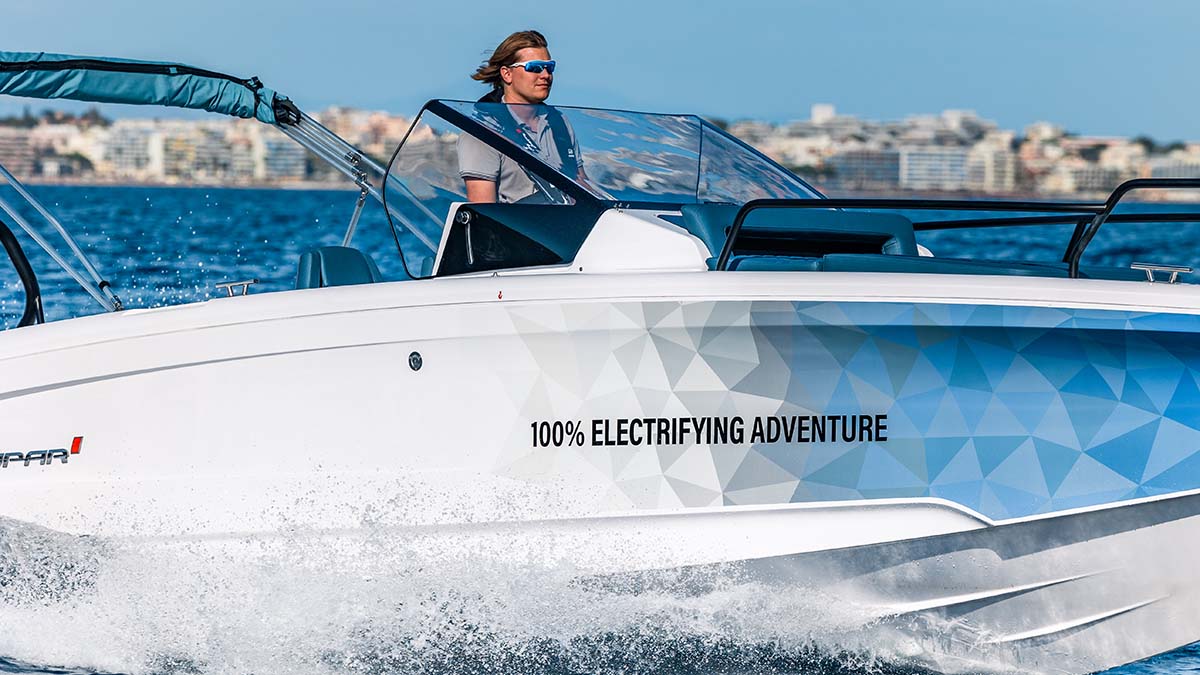
Evoy Storm: Our verdict
The anticipated price for this electric Axopar 25 is €185,000 (ex tax), which looks pretty good value given that the price of the motor alone is €74,900 plus another €69,800 for the batteries. It’s also cheaper than a Candela C-8 or X-Shore Eelex 8000.
Whether Axopar can maintain, or even reduce, that price once the Evoy Storm enters production in 2024 remains to be seen but on the basis of this first test drive, it could provide a huge boost to sales of electric boats.
Evoy Storm 300hp specifications
Power: 222kW/300hp
Torque: 550nm
Max revs: 5,800rpm
Weight: 270kg (+80kg accessories)
Batteries: 2 x 63kWh Kreisel
Starting price (ex. battery): €74,900
Price (inc. battery): €144,700
Evoy Storm 300hp performance
| RPM | 1,000 | 2,000 | 3,000 | 3,500 | 4,000 | 4,500 | 5,000 | 5,500 | 5,732 |
| Knots | 4.7 | 6.7 | 20 | 26.3 | 31 | 36.1 | 42.7 | 46.8 | 51.0 |
| Range | 51 | 27 | 25 | 25 | N/a | N/a | N/a | N/a | N/a |
First published in the December 2022 issue of MBY.



